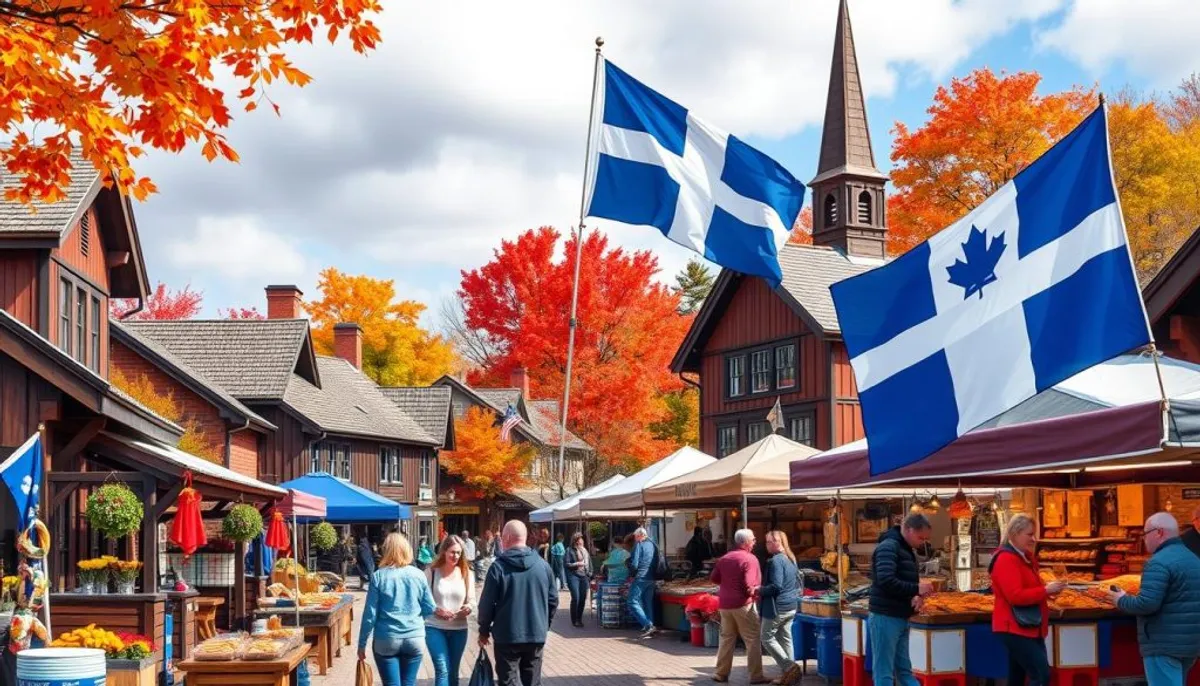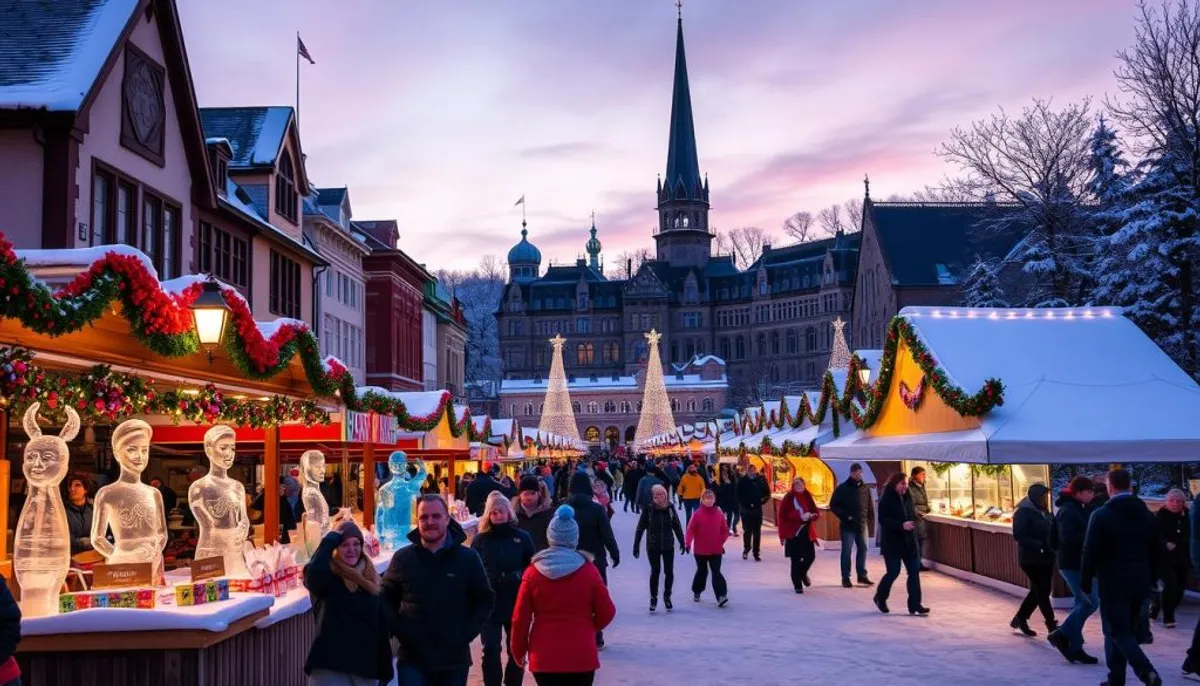The Quebec culture, a jewel of the Francophonie of America, shines with its unique identity. It draws its strength from a rich cultural heritage, shaped by centuries of history and diverse influences.
Since 1638, the fires of Saint-Jean have illuminated Quebec, perpetuating a millennia-old tradition. This celebration, once pagan, has become rooted in Quebec identity, uniting communities every June 24.

The Quebec identity is also reflected in its literature. Authors like Gabrielle Roy and Laure Conan have contributed to forging a distinct voice. Universities, including the University of Montreal, play a crucial role in preserving and studying this literary heritage.
The government actively supports artists and creators, recognizing their vital role in promoting Quebec culture. This approach aims to enrich cultural life and strengthen the link between culture and territory, thus celebrating the diversity of regions.
What is Quebec culture
Quebec culture represents a remarkable cultural specificity in North America. It stands out with a Francophone identity, resulting from a blend of varied influences. This mix creates a rich and captivating heritage.
A distinct identity in North America
Quebec distinguishes itself by its Francophone character in a predominantly Anglophone continent. This uniqueness is reflected in the language and traditions of daily life. Despite the growing influence of American culture since the 1950s, Quebec maintains its unique identity.
The unique cultural heritage
The Quebec heritage is a fascinating blend of French, British, and Indigenous influences. This cultural richness is expressed in the arts, particularly cinema. Quebec produces the second largest number of Francophone films after France, showcasing its creative vitality.
The core values of Quebec
The Quebec values are based on the protection of the French language, open-mindedness, and friendliness. These values manifest in social and cultural life, as seen during numerous summer festivals. The Montreal International Jazz Festival and the Quebec Carnival illustrate the festive and welcoming spirit of Quebec culture.
The cultural specificity of Quebec is also reflected in its passions. Hockey, considered the national sport, occupies a central place in Quebec identity. Montreal, with its numerous Stanley Cups, embodies this sporting fervor that unites Quebecers.
The history and origins of Quebec culture
The history of Quebec is rich and complex, shaping a unique cultural identity in North America. This Canadian province has experienced pivotal periods that have profoundly marked its cultural and social development.
The French influence and the colonial regime
New France, established in the 17th century, laid the foundations of Quebec culture. This period saw the establishment of the French language, Catholicism, and a seigneurial system that long defined Quebec society. French settlers brought their traditions, cuisine, and way of life, creating a distinct cultural base.
The impact of the British conquest
The British conquest of 1760 introduced new influences into Quebec culture. Despite English dominance, Quebecers maintained their language and traditions. This period saw the birth of a linguistic and cultural duality that persists today, with 81.8% of the population speaking French and 40.6% being bilingual.

The Quiet Revolution and its cultural effects
The Quiet Revolution of the 1960s marked a major turning point in Quebec's history. This period of rapid modernization saw the emergence of a strong Quebec identity. Language protection policies, such as the Charter of the French Language, were implemented. The rise in the standard of living for Francophones strengthened their role in the provincial economy, contributing to the growth of a dynamic and vibrant popular culture.
These historical events have shaped contemporary Quebec culture, blending French heritage, British influences, and modern aspirations. This evolution continues to fuel debates about identity and Quebec's place in Canada and the world.
The French language in Quebec
The Quebec French plays a central role in the cultural identity of the province. It is the official language of Quebec, dominant among the population. The Quebec government is actively committed to protecting and promoting this distinct language.
The language policy of Quebec underwent a crucial turning point in 1977 with Bill 101. This legislation established French as the language of legislation, education, and the economy. It emphasizes the importance of preserving Quebec French in the face of Anglophone influence.
The Quebec French is characterized by its specific expressions and unique accent. For example, in Quebec, "dîner" refers to the noon meal, unlike in France where it applies to the evening meal. This linguistic peculiarity shows the distinct evolution of French in Quebec.
Bilingualism is a reality in Quebec. Many Quebecers speak both French and English, showcasing the linguistic richness of the province. However, the use of Anglicisms in daily life is less common in Quebec than in other Francophone countries.
| Linguistic aspect | Quebec | France |
|---|---|---|
| Term for the noon meal | Dinner | Breakfast |
| Use of Anglicisms | Less frequent | More frequent |
| Form of address at work | Quick tutoiement | Preferred vouvoiement |
The preservation of Quebec French remains a crucial issue in language policy. It aims to ensure the vitality of this language, a symbol of Quebec's history and identity in North America.
Festive and social traditions
Quebec celebrations are a foundation of local culture. Quebec, with its more than 600 annual festivals, celebrates its traditions throughout the year. These seasonal celebrations reflect the unique identity of the province. They bring communities together around unforgettable festive moments.

Saint-Jean-Baptiste, the corn husking party, and sugar season stand out particularly. Each embodies a distinct aspect of the Quebec cultural heritage. They attract considerable crowds.
Saint-Jean-Baptiste
Celebrated on June 24, Saint-Jean-Baptiste is Quebec's national holiday. This day is marked by bonfires, parades, and outdoor concerts. It is an opportunity for Quebecers to express their pride and attachment to their unique culture.
The corn husking party
This summer tradition brings family and friends together around freshly picked ears of corn. Participants husk the ears together before enjoying them, creating a friendly and festive atmosphere. It is a special moment to strengthen community bonds.
Sugar season
In spring, the sugar shacks open their doors for sugar season. This century-old tradition celebrates the production of maple syrup. Visitors can taste traditional dishes in the sugar shacks and participate in tire sur la neige, a unique tasting experience.
These festive and social traditions play a crucial role in preserving and transmitting Quebec culture. They offer current and future generations the opportunity to connect with their heritage. They create new shared memories.
Quebec art and popular culture
The Quebec arts play an essential role in the cultural identity of the province. A study reveals that 77% of Quebecers personally value the arts and culture. This passion is reflected in strong participation in cultural activities: 78% for cinema, 71% for performing arts, and 49% for museums.
Quebec literature stands out for its diversity and depth. Authors like Michel Tremblay have brought Quebec literature to international attention. Quebec cinema is also experiencing growing success, thanks to directors who explore themes specific to Quebec society.
Quebec music skillfully combines traditional and modern influences, creating an inclusive culture. Artists like Céline Dion and Arcade Fire have made their mark on the global stage while remaining rooted in their heritage. This artistic diversity contributes to shaping a distinct cultural identity in North America.
| Perception of Quebec culture | Percentage |
|---|---|
| Creative | 67% |
| Distinct | 64% |
| Inspiring | 64% |
| Interesting | 63% |
| Original | 62% |
This data illustrates the importance Quebecers place on their unique culture. The integration of culture into Quebec education is crucial for passing on this heritage to the young. It encourages them to become curious and sensitive citizens to Quebec art.
Quebec gastronomy
Quebec cuisine is a true culinary treasure, blending traditions and innovations. It reflects the French, British, and Indigenous influences that have shaped the province. This historical fusion enriches Quebec gastronomy.
Iconic dishes
Poutine, the queen of traditional dishes, reigns at the top of Quebec gastronomy. This dish made of fries, cheese curds, and brown gravy has become a national symbol. Tourtière, a spiced meat pie, and maple syrup, the liquid gold of Quebec, complete this gourmet trio.
The influence of seasons on cuisine
The seasons rhythm the Quebec cuisine. In spring, sugar season celebrates maple in the sugar shacks. Summer sees the corn husking parties flourish, while autumn is ideal for apple pies. Winter calls for comforting dishes like pea soup.
Local products
Local products are at the heart of Quebec gastronomy. Cheeses from the Eastern Townships, ice cider, and blueberries from Lac-Saint-Jean enrich the flavor palette. Charlevoix lamb, the first protected designation of origin in North America, attests to the commitment to the quality of local products.
| Region | Specialty |
|---|---|
| Montreal | Bagels and smoked meat |
| Charlevoix | Protected lamb |
| Eastern Townships | Artisanal cheeses |
The Quebec cuisine, rich and diverse, continues to evolve. The influence of immigrant communities, such as the "couscousseries" in Montreal, adds new flavors to this already fascinating gastronomy.
Customs and social practices
Quebec traditions are deeply embedded in daily life. They reflect the unique identity of this Francophone province, located in the heart of North America.
Charivari and matrimonial traditions
Charivari, a noisy celebration for unconventional weddings, is a Quebec tradition. Although less frequent today, it illustrates the importance of unions in Quebec culture.
Family celebrations
Family gatherings play a central role in the lives of Quebecers. Christmas and New Year's Day are special moments for coming together. The preparation of tourtière, an emblematic dish, is a two-day ritual, especially for the Lac-Saint-Jean variant.
Seasonal rituals
The seasons rhythm the social customs in Quebec. Autumn is marked by apple picking. In winter, skating and skiing are practiced. Ice fishing attracts many enthusiasts, with villages of cabins on frozen lakes. In spring, the tradition of sugar shacks celebrates the harvest of maple syrup with typical dishes.
These social practices demonstrate the richness of Quebec traditions. They play a crucial role in forming a strong and distinctive cultural identity.
Conclusion
The Quebec identity, stemming from a rich cultural heritage, evolves in a changing world. The cultural diversity of Quebec, far from being an obstacle, enriches and strengthens its unique character. Ancestral traditions and modern influences coexist harmoniously, creating a vibrant and dynamic cultural mosaic.
Statistics reveal interesting changes in the cultural practices of Quebecers. Interest in certain classical forms of culture has decreased since 1989. However, there is a fusion between high culture and popular culture. The aging audience for performing arts poses a challenge for renewal, but baby boomers remain major players in cultural demand.
In the face of these challenges, Quebec adapts. The Ministry of Culture's sustainable development action plan, with its cultural agenda 21 project, reflects this desire for evolution. The Quebec identity, rooted in its French language and unique traditions, continues to reinvent itself while preserving its essence. This illustrates the resilience and creativity that characterize this unique North American culture.
RelatedRelated articles


